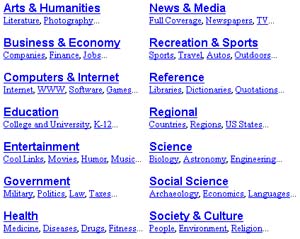While search engines are automated software programs, directories are created by humans.
A directory (such as Yahoo) employs hundreds and even thousands of reviewers that keep a look-out for new web pages (by browsing the web, reading magazines, listening to friends, etc.) and then visit and review these pages to see if they are worth including in their database. Often webmasters will also submit their web sites for review.
If the reviewer feels that the site is worth including in their database (which if most of the time), they then direct their software spider to visit, index and catalogue the site. These reviewers also decide under which subject category within the directory, the web site fits best. Unlike a search engine where the process is all automated, with a directory the process begins with human review and that is where the main difference exists.
![]() Because of the way directories are built up, they tend to have much smaller databases than search engines (Yahoo’s database is only a few million pages big), but their results are usually more accurate and relevant. Also the browsing nature on which directories work, tends to be more intuitive and user-friendly and for this reason, directories have proved very popular amongst users. Still today, Yahoo is one of the most popular and successful of the search services.
Because of the way directories are built up, they tend to have much smaller databases than search engines (Yahoo’s database is only a few million pages big), but their results are usually more accurate and relevant. Also the browsing nature on which directories work, tends to be more intuitive and user-friendly and for this reason, directories have proved very popular amongst users. Still today, Yahoo is one of the most popular and successful of the search services.
If you chose to search using a directory, you will enter your query in the same way as with a normal search engine but the results returned will be from a much smaller database. Also, the results will be presented according to the categories under which the various sites have been indexed.

Yahoo’s directory structure Great for browsing!
Directories also offer reviews, interviews, news and searchable databases. Many of the traditional search engines have added directories to their search facilities and are now considered more hybrids than true search engines.